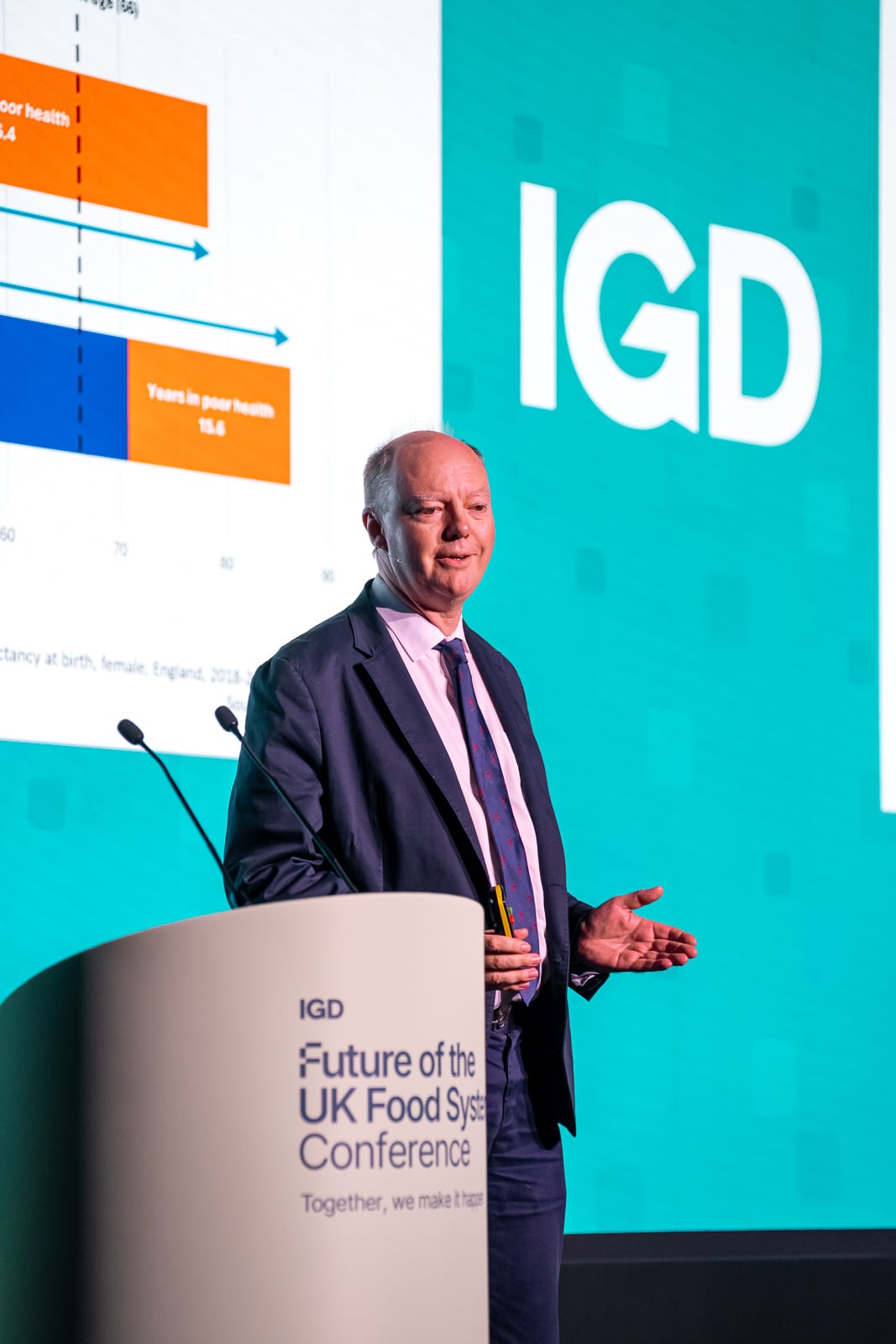Studies have shown that the richer you are, the longer you can expect to live.
Whilst we generally associate old age with ill-health, those who are living longer in higher income households are also experiencing a much shorter period of ill-health than those in deprived areas.
“Our assumption is an older population ultimately means an unhealthy population, in fact the reverse is true,” Chris Whitty, England’s chief medical officer told spectators at a recent IGD conference.
The UK government’s chief medical adviser was highlighting the imbalance between classes and their access to healthier food. This is not only unfair but it’s also placing immense pressure onto the NHS, with the actions people take earlier in life leading to premature disease. As the saying goes, prevention is better than cure.
Health regulation is being ‘gutted’ by lobbying
Whitty explained that the good news is that it’s possible to make an impactful change on Britain’s health, the ‘bad news’ is that it might hit the food sector’s profits.
He pointed to smoking as key example: “There has been a massive reduction in smoking particularly in younger people. This was made in opposition to the industry; and as a result, the industry is going to be destroyed.”
Anna Taylor, chief executive at The Food Foundation, made similar comments during a panel discussion at the event.
“We do need to make sure these commitments are not heavily lobbied against by the food industry,” she said, referencing the promising pledges to come from the likes of the NHS 10-year plan.
“And I’m saying that because we’ve got a very live example at the moment with the advertising regulations due to come in at the beginning of next year, and they’ve been really gutted, frankly, by industry lobbying.
“We have now have an exclusion of brand advertising which means it’s acceptable to advertise Dairy Milk for example but not a Dairy Milk bar. This means the real spirit of that regulation around protecting our children from the worst effects of advertising are really being undermined.
“We’ve got to ensure that the intention set out by the NHS plan with the various commitments are maintained and protected as they’re finalised.”
Solutions unfit for purpose
When it comes to obesity, the rates in England have been going up steadily, moving from 15% in 1993 to 29% in 2022.
But this average actually hides the real problem, according to Whitty.
In areas of affluence the rates of obesity in children are pretty low and stable, whereas in areas of deprivation, they are very high and rising.
“This is a very serious problem,” he said, noting that obesity in children is particularly problematic for long-term health.
“Once you gain weight, losing it again is incredibly difficult. That is why we do not want children to leave childhood living with obesity because they are going to find it very hard to reverse that.”
Simplifying the science, Whitty explained that our bodies are ‘programmed’ to return to our heaviest weight.
“That’s why when people lose significant amounts of weight, they find it difficult to maintain it and they do, what’s called, yo-yo dieting.”
He added that this may also cause issues for those taking weight loss drugs: “When you lose weight, you lose fat and muscle, and when you regain weight, you regain fat but not the muscle. So if people take GLP-1 on and off, and on and off, they could be steadying losing muscle over their lifetime and that’s not something you want going into old age.”
For Whitty, the solutions that have been offered up by government aren’t sufficient, describing them as “achingly middle class”.
“We should do mandatory reporting on a geographical basis because averaging out across the country actually disguises the fact the problem is quite highly concentrated. To be clear all income groups could do with losing some pounds, but the biggest impact is in these areas of deprivation.”
If we focus on these areas with targeted policy, Whitty believes the rest will follow.
Whilst the CMO warned the solution moving forward won’t be good for business, there’s always opportunity. Afterall, necessity is the mother of invention.
As Andrew Selley, CEO of Bidcorp told audience members: “The more healthy options you make available, the more healthy options are chosen. In food service, we know that if you have one healthy option on the menu about 10% of people are choosing it. If you have three healthy options, it’s more like 40% of the sales.”
But the other side of this coin is education: unless consumers understand the link between health, nutrition and food, they simply won’t buy those products. It is therefore key, that the industry, alongside government focus on improving awareness and making healthier food more accessible – especially at a younger age.
“We know that when children eat well at school they learn better. We’ve had some increase in free school meals funding, but I think two things need to change. One, it needs to increase to encompass all school children, and secondly, it needs to be ringfenced. A head teacher can still use it (funding) to buy sports equipment and spend it on teaching assistance. That’s not acceptable,” argued Selley.
Confidence to invest
Importantly, moving forwards the policy needs to be clear and a long-term view taken to ensure the food industry has confidence to invest. It’s simply not fair to ask for manufacturers to change things and then make revisions or delay last minute.
“For good growth we need to be able to invest. To be able to invest we need to have a clear picture of what future costs are coming our way and obviously that isn’t the case at the moment,” said Selley.
“We need a consistent, long-term framework. We flip-flop around and we change the goalpost. That does not help businesses invest in the future,” added James Mayer, president at Danone, UK & Ireland.
Taylor agreed that diversions and revisions to texts are causing issues - and sometimes it’s actually (in somewhat of a juxtaposition of calls for long-term clarity) demands from industry which are driving these delays.
But as the Food Foundation boss reminds, there is room for tweaks later: “We must make sure that perfect doesn’t become the enemy of the good in terms of actually getting it going. We might not get it right first time, it [regulation] needs to iterate and improve over time."





